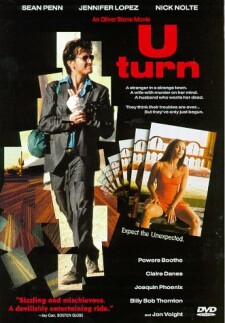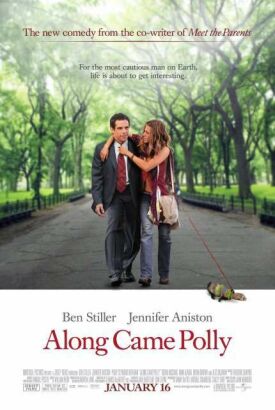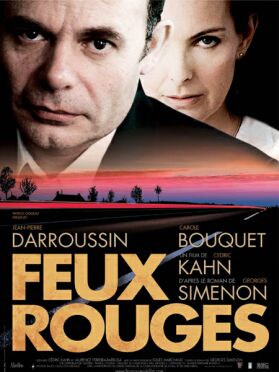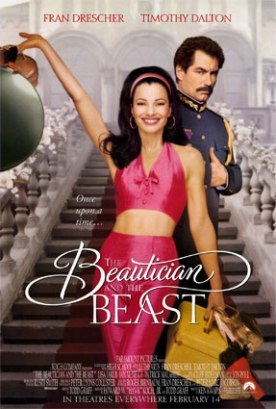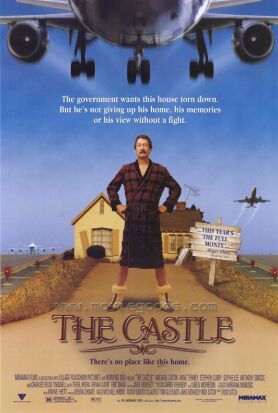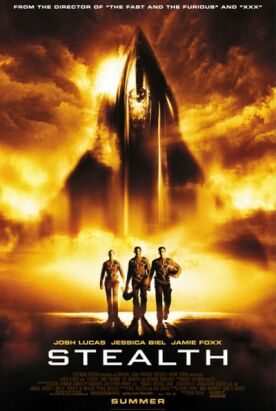U-Turn
Surprisingly, U-Turn by Oliver Stone is actually a rather enjoyable evening in the cinema, or it would be if it weren’t marred by the patented Stone phantasmagoric style. Dealing with a whimsical script like this one (by John Ridley, adapted from his book “Stray Dogs”) is something Stone should never allow himself to do, because it liberates his worst impulses to overstuff his movies with unnecessary images and details. If they were wallpaper, his movies would be “busy.” They are exhausting to watch. There may be some excuse for this when he is dealing with one of his big, world-historical epics (actually, I don’t think so, but the world historical epics have worse problems to worry about), but in a bit of fluff like U-Turn, the portentous piling-on of images is especially unfortunate.
Still, it does not entirely obliterate fine comic performances by Billy Bob Thornton, Nick Nolte, Joaquin Phoenix, Claire Danes and others to say that, like everything else in the picture, they are pushed too far and exaggerated to the limit. Sean Penn does a fine job, too, as the central character, Bobby Cooper, who, if he does not exactly respond with grace under pressure to the worst day of his (or, I suspect, almost anybody else’s) life, does at least win our sympathy. As he is driving across the desert in Arizona, on his way to Las Vegas to pay off a gambling debt to some vicious Russian mobsters who have recently taken off two of his fingers, Bobby’s car, a vintage Mustang convertible overheats. He is forced to entrust it to the only garage in the town of Superior, Arizona, which is run by an appallingly dirty man called Darrell (Mr Thornton) who is, as Bobby later observes, “dumb as a sack of hammers.”
He is required to spend a couple of hours in the one-horse town of Superior where everybody is a little strange. Most strange of all is a young woman called Grace (Jennifer Lopez) who is in the process of a strange, stop-and-go seduction of Bobby when her husband, Jake (Mr Nolte) comes home and knocks him down. Bobby scrambles to get out of the house but Jake, strangely conciliatory comes after him. He has a proposition to make. How would Bobby like to make some money by killing Grace? “You’re a man without scruples,” he tells him. “I can smell it. That’s the sweat of a man who hasn’t got an honest bone in his body.” Not that this is an insult, you understand. To Jake, “A man with no ethics is a free man.”
“I’m not a murderer,” Bobby replies.
“How do you know if you never tried?”
So far, it sounds like a familiar noir plot — which, at its most basic level it continues to be throughout. But along the way there are a succession of bizarre and unexpected adventures with even more bizarre and unexpected characters, à la Tarantino, which all operate together like a malign fate to bring Grace and Bobby to the familiarly noirish dénouement. As the blind Indian beggar and Vietnam vet played by Jon Voight puts it: “Nothing makes the Great Spirit laugh like a man’s plans.”
There is also always a sense of the disproportion between the smallness of our ambitions — to make a little money, get a drink or have a car repaired — and their tremendous consequences. Another character, plotting with a wife to kill her husband, cries out: “What about our plan of going to Milwaukee and opening the finest damn sporting goods store that city ever saw?” It’s a fine idea, but cluttered up, as I say, with a surplus of images and too many soap-opera-like complications to the unnecessary tale of Grace’s unhappy past. If only Stone could trim these things away along with the politics, he’d be well worth watching.
Discover more from James Bowman
Subscribe to get the latest posts to your email.

